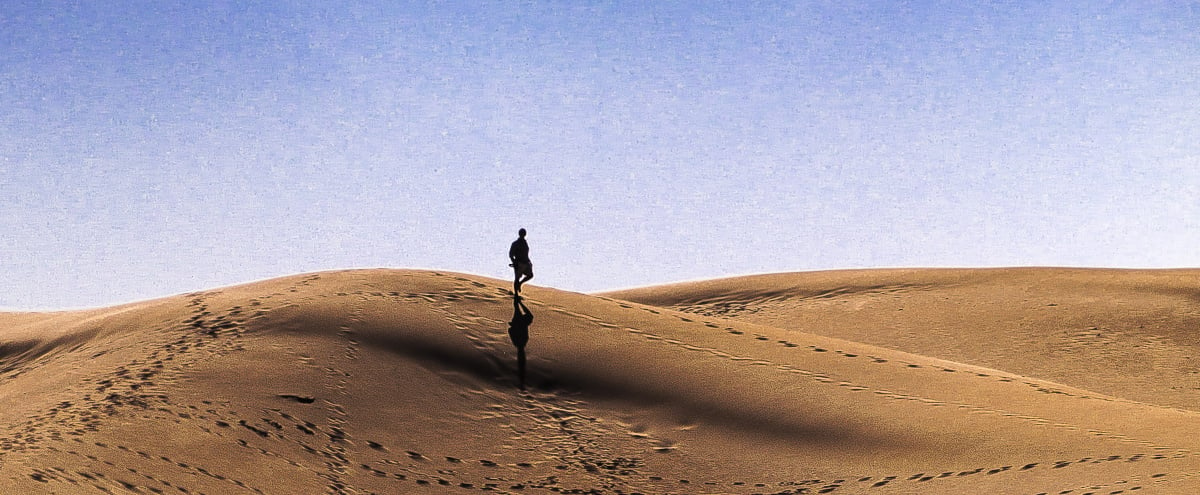- Blog
- green light
- Dune - A...
Dune - A Prediction, and a Warning
Jan 28, 2022 | written by: Rebecca McNamara
In a world where water is scarce, greenery is rare and a planet is exploited for its resources, we find an uncomfortable reflection – and a dire warning.
I watched the new Dune film for the first time this past weekend, nestled in a pile of pillows on my living room floor, phone in one hand, and a bag of crisps in the other. With my attention thus diverted, I found the film enjoyable, but complicated and difficult to follow, and the credits rolled with little fanfare.
I thought that was that, but almost two full days later, this bleak vision of our future was still nudging the edges of my subconscious. I realised that I had missed the point. I watched it again, this time with snacks and phones banished to the other room. An arid landscape, oppressed peoples, and corrupted power. I had missed the warning that was being all but screamed in my face.
Set in the year 10,191, society has an interplanetary, medieval feudal structure, with ruling houses granted control of various planets, or “fiefs”. At the opening of the film, the House of Atreides is given stewardship of the desert planet Arrakis – an arid, inhospitable land, but the sole source of a coveted substance called “spice”. The local people here, the “Fremen”, are considered akin to savages, and have long been subjugated and dismissed by those in power.
Already we see some not-so-subtle parallels between “spice” and oil (and the politics involved in mining valuable commodities at the expense of local communities), but what makes Dune particularly prescient is the ecological aspect.
In the foreword of the original 1965 novel, author Frank Herbert dedicates the story to "the people whose labours go beyond ideas into the realm of 'real materials' - to the dry-land ecologists, wherever they may be, in whatever time they work, this effort at prediction is dedicated in humility and admiration."
Consider, then, Arrakis not as an abstract planet, but as a prediction of the future of our planet. Drained of all life, valuable only for the resources we can extract from it, with the people considered secondary, and the health of the planet considered not at all. A little over 50 years after publication, Frank’s prediction feels pretty familiar, no?
In July 1980, Frank wrote an essay for Omni Magazine on the inspiration for Dune. He reveals that the book was born of the concern that “ecology might be the next banner for demagogues and would-be-heroes, for the power seekers and others ready to find an adrenaline high in the launching of a new crusade”.
So here we are, in 2022, where climate change is discussed daily in our media and in the boardrooms of CEOs and politicians the world over. Too often, the narrative is rooted in doomsday messaging, in blame and exaggeration. Too often, the people most directly affected are left out of the conversation. Too often, those responsible for the acceleration of the problem, are those we trust to bring resolution.
In Frank’s words, ecology is the banner, but who is waving it? Is it waved by those who wish to save us and our planet from an arid, desert future? Or by those who want to empty our pockets, and our planet? Those who wish to exploit the crisis to gain further access to our planet’s resources?
Frank said, “Our society, after all, operates on guilt, which often serves only to obscure its real workings and to prevent obvious solutions.” What happens when we take away the noise, when we look beyond the banner? What are the obvious solutions?
It starts with appreciating what we have, looking after it, working with and supporting the communities who call this planet home, prioritising our planet’s health. Understanding what is important, and what is not.
There is a scene in the film, where a man slowly, lovingly ladles water onto the sand around a date palm. He tells Timothée Chalamet that the tree requires 40 litres of water a day to be kept alive - and where a man requires but eight, the 20 palms on the estate drink the equivalent of 100 men. Timothée considers the palm, a hand pressed to the bark. He suggests uprooting the trees and conserving the water. The man looks up from his ladle in surprise. No. No, no. “These are sacred.”

- Dune (1985), di Frank Herbert
- Dune (2021), regia di Denis Villeneuve
- https://vasil.ludost.net/dunegenesis.pdf
- https://daily.jstor.org/the-ecological-prescience-of-dune/

